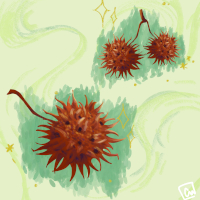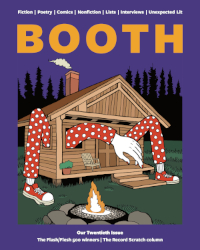by Mike Meginnis
Excerpt from a novel manuscript
Chapter One
A woman drove onto the tracks and stopped there. She put the car in park. She switched off all its lights. Her only passenger, a broad-shouldered and almost totally waistless man in black spandex and bright red cape, was not apparently perturbed by her decision to end it all with him there beside her, though she had not previously declared her intent to die, and though the train would likely hit him first, given the usual eastward direction of the many cars of produce, name-brand breakfast cereals, disposable cellular phones, diapers and dairy products that came through town at roughly 10 PM on Tuesdays. The man in the cape turned to look at her. This movement produced a small puff of air that kissed her passenger-side cheek. He blinked two times, which caused two more little puffs. He asked her was she aware she would die here. The woman said she knew. The man in the cape had beautiful blue eyes, though they were very cold.
His mouth was tight. It puckered slightly. He said, “The train won't see your car in time to brake. They'll hit the car. This will kill you, and inconvenience the train, and the people who operate the train, and those that depend on its timely arrival.” The woman said she knew all this as well. She pointed out that everyone else would be only minorly inconvenienced by her death, whereas she would be killed. She took a lukewarm swallow of Natural Light, which was legal now, more or less, the car being parked and she having no plans of farther driving. The man in the cape told her he could fly out through the window and stop the train now if she liked. He said that he'd done it before. “Stopped a train,” that is, he said. “With my hands.”
“I'm sure you have,” said the woman.
Somewhere another woman lay on her garage floor shivering. Call her the addict. The addict's hands and cheeks were rashed and flaked from dryness. There was dried vomit and urine on her and the cement. The faintly acidic smell had become a part of the dust and oil smell of the garage, and their combined effect was not unpleasant. A man in a red cape stood over her, the end of his cape lifting and lilting from the force of her thrashing, though she could not reach him to touch, though she did try. This man in a cape was identical to the one in the car on the train tracks somewhere else.
The shivering addict had stopped begging him for help the day before, after his three hundredth repetition of the phrase, “But I am helping you.” He had decided it was time for her to detox, had decided she was ready. He told her so. He pushed her down on the garage floor. She got up and he pushed her down again. She got up and he pushed her down again. He kept pushing her down until she stayed there, and then the shivering began, and all the tearful begging. Now she couldn't get up if she wanted.
Somewhere a family of four sat together at the kitchen table. Standing behind each member of the family, an identical caped man, meaning four caped men in total, which would offer nutritional and dietary information by request, or on their own initiative. Sometimes their voices overlapped, and if they were saying the same word this amplified the word, and if they were saying different words this amplified the noise of their voices, but made the words insensible. The members of the family (a little boy, his older sister, their mother and stepfather) did not speak but ate their dinner, which was rosemary chicken with a side of wild rice. The mother was not wearing lipstick. The stepfather was not berating his children. The children were not using electronic devices of any kind, Gameboy or iPod or other. This peace allowed them, when the four caped men were not speaking on the benefits of fruit, perfect hearing of each other's forks and knives, which scraped each other and their sunshine-yellow plates.
The woman on the train tracks had finished her first Natural Light and now she popped the second's tab. The woman's body was covered with stretch marks all over, which arranged themselves in complicated patterns corresponding arcanely to the shapes and movements of their underlying muscle and bone, the results being like a paisley pattern on her skin but also like tree rings – a record of her life. Most of the stretch marks were a dark pink in daylight. Now, in what light a distant streetlamp could afford, they were purple. There were such marks extending from her eyes to her ears, like exaggerated crow's feet or bolts of purple lightning. Six pairs of stretch mark parentheses framed her mouth. There were purple rings around her knuckles. Her arms were densely networked with these marks, particularly around the biceps, triceps, and other major muscles. Her hair was combed straight for the first time in months. It was green, and in its straightness very fine and thin. It smelled of a certain shampoo.
The man in the cape adjusted his seat belt as if this was the cause of his discomfort. He took great care in his every motion because it would be so easy for him to kill someone by accident. First he looked at the seat belt. Then he decided how he would move it. Then he slipped his thumb beneath the belt. This briefly creased the large red E emblem on his chest. He slid the belt down his chest maybe half an inch, which removed the belt's edge from his neck, where it had exerted certain pressure.
“I would like to stop the train for you,” said the man in the cape.
“I'm not stopping you,” said the woman with stretch marks. “I can't stop you.”
“I want you to want me to do it,” said the man in the cape. “To stop the train.”
“Nobody can stop you,” she said.
Somewhere a man watched another caped man remove the books from his bookshelf one by one, discarding those that were intact with a snap of his wrist. Call the watching man the scholar. Those books that were false – the ones gutted with a razor blade to make room for booze, pills, or guns – were usually Bibles. Those books that were false the caped man burned to ash with his laser eyes. The contraband he dropped on the floor, not with the wrist-snap reserved for intact books but rather by burning the false book around the gun or the flask, so that the ashes also fell, and would (the man realized) stain the carpet. The scholar was weeping because of all the Bibles he'd gutted, which were ashes now, or would soon be. He was not a believer in the Bible but a student of its history.
The woman on the train tracks wore a man's white tank top undershirt. The fabric was ribbed. She weighed about three hundred eighty pounds, though most people would have guessed lower. This was not the cause of the stretch marks: she had grown into her weight naturally over a long period of time, the way any person grows into her own body. She had long ago cut the tags out of all her shirts so she wouldn't have to see their size, and the present shirt's threadbare tag-stump itched the base of her neck incessantly. In addition to the tank top she wore a blue flannel shirt, unbuttoned. The sleeves were cut off, these with the same scissors that did the tag, and what was left was rather frayed, with some semi-shiny strands extending several inches from her arms. Her pants were purple sweats. She did not shave her arm pits or anywhere else, and had not done for years. She drank deeply of the Natural Light.
The train was bearing down on them. They could hear its whistle, rumble. They could see the lights. The boom barriers fell into place on either side of the tracks and the red warning lights flashed, which had the effect of seeming to trap the woman's car. “It's not too late,” said the man in the cape. The woman crushed the empty can against her forehead. This had its usual calming effects. Call her Ruth. Call the caped man her Exemplar. So far as she knew, everybody had one.
Ruth was fifty years old. The clerk at the Pic Quik had insisted on carding her before he would sell her the Natural Light. This was three days before, the last time she left the house. He thought this was a little joke they had together. Ruth thought it was cruel. There was no mistaking she was over twenty-one, and there was no forgetting her face, if you knew her; recall the stretch marks; recall the thin green hair (usually unwashed, often pulled up in a sumo's topknot). So the joke was she was a hag. Of course she knew she was a hag. Not every true thing was terribly funny. She had known the clerk's predecessor, and his, and his as well, and hers. That particular Pic Quik gave her a discount for an act of heroism from her youth, is why she always used that Pic Quik. The discount was five percent. They were, she knew, still turning a profit. She opened another can. It was sweating profusely, the can. It was colder on the outside than inside. The night air was humid even in the car. She knew she had drunk exactly thirty cans of Natural Light (or sometimes Busch) a week for the last twenty years because this was what she had allowed herself. This was regardless of whether or not she drank it all in the first two or three days, as became increasingly common. She defined alcoholism as buying more than one case in a week. And so she would spend two or three days at a time in withdrawal before marching down to the Pic Quik for another. The case she had now held two more cans. She didn't think she'd have the time to do them both. They were – the case was – ensconced in the backseat, on the floorboard, among blue piled empty cans (half of them crushed against her forehead), mostly-empty fast food bags, coupon mailers, pizza boxes, and chewed-through ballpoint pens.
Somewhere a young boy tortured a cat. He was using a hammer. Call him the killer. His Exemplar was watching calmly through those cold blue eyes. The killer asked him why he didn't stop the killer. The cat was seeping blood and tears and urine. Its skull was split down the front, which did not offer a good view inside, but rather only blackness, like a fold of night. The Exemplar said the cat was an animal. He did not afford cows or pigs or sheep his protection either, or fish. He did tell the killer, however, that this behavior did cause him concern. He recited the relevant statistics. The likelihood a boy who tortured cats would commit violent crimes against people. The likelihood the boy was sometime in the past a victim of abuse. “Sexual abuse,” he said. He asked the killer, “Has a grown-up ever touched you? Somewhere you didn't want to be touched?” The cat's eyes had stopped moving. The Exemplar affected an expression of empathetic concern. The killer preferred the eyes of the cat.



